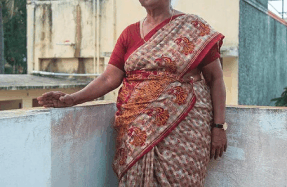
{ONE}
“SINCE COLLEGE SHUT DOWN due to the pandemic, evenings on this terrace are possibly the only thing that have held me together,” a student of the National University of Juridical Sciences told me in the summer of 2020, sitting atop a concrete water tank on a terrace sandwiched between two taller buildings in their home city. “People in college seem to be living in a world apart—landing internships, acing their exams. No matter how hard I work, it doesn’t seem to translate.”
The student, then in the middle of their law education, had been born with a medical condition that left them with a serious disability. Doctors confirmed early on that they would need special education. The student was motivated to pursue law in the hope of improving their family’s modest financial circumstances and due to a deep interest in politics and society. At the age of 17, they cracked the highly competitive Common Law Admission Test, the gateway to the country’s 23 National Law Universities. Before the COVID-19 pandemic hit, the student joined NUJS, in Kolkata, as one of the small minority of disabled students at the university. This is where, chatting away one afternoon, we met each other as fellow students.


On the terrace of their home, the student turned to tell me they knew what I might say: that this was not their fault, that the pandemic had pushed millions of students like them into isolation and academic stagnation. “But sometimes it’s difficult to tell yourself that this isn’t your fault,” they said. “It’s not that simple.”
NUJS, like most NLUs, had no established system to cater to the special needs of disabled students. After they joined, the student took remedial classes and had access to some special academic resources from the non-profit group Increasing Diversity by Increasing Access, but they received limited help from the university. The student is also a Bahujan—making them even more of an outsider in the elite-dominated culture of the NLUs. “I knew I was never going to belong,” they said. “I found myself in a crowd that was miles ahead of me in terms of how much capital they could exploit.” This crowd, the student added, “determined the college culture in many ways: they were our parameters of success and also of leisure. It is their language that becomes the language of law school.”
The student barely socialised in their first year. Things only got worse during the pandemic, and I watched them struggle to survive through subsequent academic years. Online assessments, part of NUJS’s move to remote learning, greatly disadvantaged disabled students, but teachers remained largely apathetic to their difficulties, and there were no serious efforts to sensitise them. When I emailed NUJS’s vice chancellor, NK Chakrabarti, to ask what measures the university takes to help students with disabilities, he sent back a terse reply. “Let me know who are your respondents?” Chakrabarti wrote. “Give me their Names and Roll numbers. I will respond in front of those students with evidence that your narratives are biased and fully misleading information.”
When the NUJS campus reopened this year, the student returned to Kolkata. But issues with accessibility in examinations and administrative structures remained, and the psychological ghosts of the pandemic stuck with them. The student kept going through their five-year NLU education not because of the atmosphere they encountered on campus but despite it. Theirs is one of many stories, spanning the whole country, of students’ struggles at India’s premier law universities, which have for years remained unrelenting to urgently needed reform.
“DUE TO VARIOUS CONSIDERATIONS most students from NLUs end up in corporate law firms,” NV Ramana, the chief justice of India, told graduating students at the National Law University in Delhi, in December 2021. “It is unfortunate that a comparable addition is not being made to the ranks of lawyers practising in courts from the NLUs. This is perhaps one of the reasons why NLUs are perceived as elitist and detached from social realities.”
Ramana’s comments came as a surprise to many. The habit in high legal circles—the judiciary and the bar council, state legislatures and parliament—is to sing the praises of the NLUs, not offer frank criticism. But to many others, including students like me, the CJI barely scratched the surface of the institutions’ problems.
Ramana had a valid point: the NLUs are meant to be public universities, yet their alumni increasingly serve the private good. But graduates’ career choices are more a symptom than a cause of the elitism endemic in these institutions. Its roots lie in unaffordable fees, poor scholarship programmes and resistance to more reservations for marginalised students. Ramana did not talk about these things openly—almost nobody does—for to do so would reveal a far more fundamental institutional crisis, one that leads back to him and other judges in charge of the country’s highest courts, who hold chancellorships and other high positions at the NLUs.
Over the past thirty-five years, 23 NLUs have been established across 18 states. A second NLU in Uttar Pradesh is in the works, as are proposed NLUs in Tripura, Uttarakhand and Sikkim. Seven of the top ten law schools in the National Institutional Ranking Framework are NLUs, and the National Law School of India University, in Bengaluru, was ranked as one of Asia’s top law schools in 2020. These institutions, despite small student populations—roughly two thousand six hundred graduates a year from the NLUs against the more than ninety thousand law graduates produced by other colleges—have produced one of the most illustrious alumni bases in Indian education. Graduates pop up at the United Nations, Magic Circle law firms in London, the New York State Bar Association, leading media houses in India and abroad, as well as the cream of India’s corporate legal practices. The top NLUs boast staggering placement records, with graduates landing jobs




